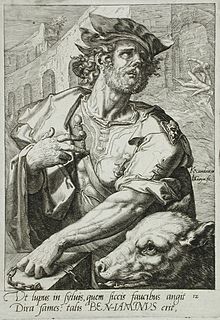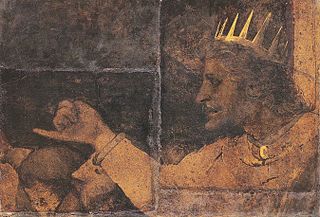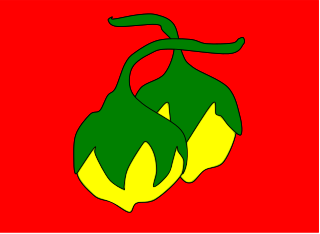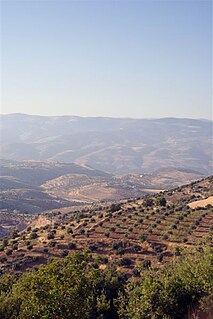Related Research Articles
Abijah is a Biblical Hebrew unisex name which means "my Father is Yah". The Hebrew form Aviyahu also occurs in the Bible.

Benjamin was the last-born of Jacob's thirteen children, and the second and last son of Rachel in Jewish, Christian and Islamic tradition. He was the progenitor of the Israelite Tribe of Benjamin. In the Hebrew Bible unlike Rachel's first son, Joseph, Benjamin was born in Canaan.

Rehoboam was the first king of the Kingdom of Judah. He was a son of and the successor to Solomon and a grandson of David. In the account of I Kings and II Chronicles, he was initially king of the United Monarchy of Israel, but after the ten northern tribes of Israel rebelled in 932/931 BC to form the independent Northern Kingdom of Israel, under the rule of Jeroboam, Rehoboam remained as king only of the Kingdom of Judah, or southern kingdom.
Abiezer or Abieezer is the name of three Biblical characters. The name means "father of help" i.e., helpful. The characters are:
Adiel is a personal name meaning "ornament of God", or possibly "God passes by". It could be used to refer to any of the following:
- The father of Azmaveth, who was treasurer under David and Solomon, mentioned only in 1 Chronicles 27:25.
- A family head of the tribe of Simeon, who participated in driving out the Meunim, mentioned only in 1 Chronicles 4:36.
- A priest mentioned only in 1 Chronicles 9:12, in the genealogy of Maasai.

According to the Hebrew Bible, the Tribe of Zebulun was one of the twelve tribes of Israel.

According to the Hebrew Bible, the Tribe of Reuben was one of the twelve tribes of Israel. Unlike the majority of the tribes, the land of Reuben, along with that of Gad and half of Manasseh, was on the eastern side of the Jordan and shared a border with Moab. According to the biblical narrative, the Tribe of Reuben descended from Reuben, the oldest son of the patriarch Jacob. Reuben, along with nine other tribes, is reckoned by the Bible as part of the northern kingdom of Israel, and disappears from history with the demise of that kingdom in c. 723 BC.

Joab the son of Zeruiah, was the nephew of King David and the commander of his army, according to the Hebrew Bible.

According to the 1st Book of Samuel Chapter 25, Nabal, was a rich Calebite, described as harsh and surly. He is featured in a story in which he is threatened by David over an insult, and ultimately killed by God.

According to the Torah, the Tribe of Benjamin was one of the Twelve Tribes of Israel. The tribe was descended from Benjamin, the youngest son of the patriarch Jacob and his wife Rachel. In the Samaritan Pentateuch the name appears as Binyamīm.

Ephraim was, according to the Book of Genesis, the second son of Joseph and Asenath. Asenath was an Egyptian woman whom Pharaoh gave to Joseph as wife, and the daughter of Potipherah, a priest of On. Ephraim was born in Egypt before the arrival of the children of Israel from Canaan.

Gilead or Gilad is the name of three persons and two geographic places in the Bible. Gilead may mean 'hill of testimony'. If this is the case, it is likely derived from גלעד gal‛êd, which in turn comes from gal and ‛êd. There also exists an alternative theory that it means 'rocky region'. It is now within the Kingdom of Jordan.
Maacah is a non-gender-specific personal name used in the Bible to refer to a number of people.

Shimei is the name of a number of persons referenced in the Hebrew Bible and Rabbinical literature.
Baale of Judah, meaning "lords of Judah" or "citizens of Judah" was a city in the tribe of Judah from which David brought the ark into Jerusalem. In 1 Chronicles 13:6, the city is called Kirjath-jearim. According to Gesenius, the town of Baale of Judah is referred to not only as Kirjath-Jearim but also as Baalah.
Lo-debar was a town in the Old Testament in Gilead not far from Mahanaim, north of the Jabbok river in ancient Israel. It is mentioned in the Hebrew Bible as the home of Machir, a contemporary of David..

Manasseh or Menashe was, according to the Book of Genesis, the first son of Joseph and Asenath. Asenath was an Egyptian woman whom Pharaoh gave to Joseph as wife, and the daughter of Potipherah, a priest of On. Manasseh was born in Egypt before the arrival of the children of Israel from Canaan.
References
- "Abihail", International Standard Bible Encyclopedia.
![]() This article incorporates text from a publication now in the public domain : Easton, Matthew George (1897). Easton's Bible Dictionary (New and revised ed.). T. Nelson and Sons.Missing or empty
This article incorporates text from a publication now in the public domain : Easton, Matthew George (1897). Easton's Bible Dictionary (New and revised ed.). T. Nelson and Sons.Missing or empty |title= (help)
| This page or section lists people that share the same given name. If an internal link led you here, you may wish to change that link to point directly to the intended article. |
| | This article related to the Hebrew Bible is a stub. You can help Wikipedia by expanding it. |